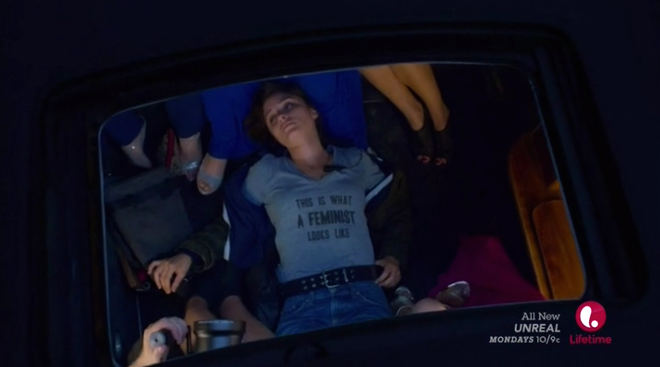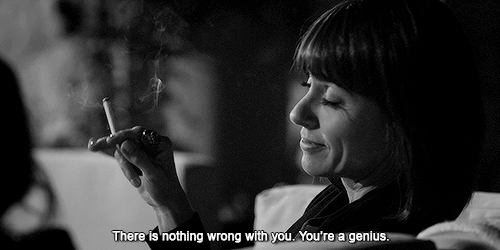Bad Ass Women And Excellent Television: UnREAL’s Meta-Commentary Tackles The Worst Of Reality TV
Welcome to your new favourite show.
“It’s good TV!”
This is a line you’ll be hearing a lot while watching the first six episodes of UnREAL, that just landed on STAN. And you will be watching all six episodes, probably in one delectable binge session, because UnREAL is really good TV.
Following the lives of the producers, contestants and crew of Everlasting, a fictional match-making reality show, UnREAL centres around producer Rachel (Shiri Appleby from Roswell) and her delectably ruthless boss Quinn King (Constance Zimmer). After a very public breakdown — “This job is Satan’s Asshole!” she screamed down the camera — left her financially beholden to the production company, Quinn forces her “gifted” protege back to the set, and back in the game.
We’re introduced to Rachel in a limo filled with ball gown-clad female contestants. She’s lying on the floor of the car, hiding from the camera among their stilettos, while holding up a picture of the prize suitor Adam (Freddie Stroma): the British heir the successful Cromwell Hotel fortune. While the bubbly women sip bubbly around her, Rachel looks defeated and apathetic. Her unwashed t-shirt reads ‘This is what a feminist looks like’. She reeks of self-loathing.

UnREAL is clearly not a subtle show. It was never going to be — in the States it airs on Lifetime, a network renowned for its glossy dramas like Marc Cherry’s Devious Maids or reality hits like Dance Moms. But through its intrinsically histrionic approach, UnREAL succeeds in navigating the conflict that reality television manifests in producers, contestants and, you guessed it, us: the complicit, addicted, besotted and relentless viewers. (As I write this at 9am, my housemate is downstairs catching up on MasterChef as if it will offer him more sustenance than the breakfast he’s skipping.)
Although fictional, the drama that goes into creating Everlasting behind the scenes — drugging, emotional coercion, blackmail, manipulation — is detailed with such debased and bombastic precision that it’s totally believable. Not only does the casting of mentally ill contestants by mentally ill producers eerily echo Jon Ronson’s chapter about Jerry Springer in The Psychopath Test, but UnREAL’s very own creators bring some insider cred.
Co-creators Martin Noxon and Sarah Gertrude Shapiro understand Hollywood, drama, and reality TV. Shapiro is adamant that she hasn’t drawn directly from previous experience as a producer on The Bachelor — a job that apparently lead her to contemplate suicide — but UnREAL does cut very close to the bone (not just during those spa nights, either).
All Hail The Difficult Women
As has been noted pretty much everywhere, UnREAL throws entire episodes of shade at The Bachelor — but that’s not the central story here. It may not be the first show to comment on the privately-loved, publicly-maligned, ratings-bonanza genre of reality television, but UnREAL offers a unique take about how how it makes us feel. “Like a slaughterhouse expose, UnREAL is designed as an audience intervention, forcing viewers to taste the cruelty in their reality-TV bacon,” writes Emily Nussbaum for the New Yorker. “The fact that the show itself also tastes like bacon – at once sweet and salty, greasy and irresistible – is no accident.”
Critics are also relishing UnREAL for its refreshing take on the antihero, in an era that’s been saturated with idolised “Difficult Men”. As Slate’s Willa Paskin surmises, “UnReal skirts the mistakes that so many antihero copycat shows have made, not by forsaking the antihero or his attendant themes, but by putting them in a new, generative setting: one concerned with women.”
Between the on-screen and behind-the-scenes love triangles, and the generally extreme plotlines and intense foreshadowing, UnREAL’s meta-commentary becomes meta-meta-meta commentary about a genre that decimates, exploits and ridicules women, while it entertains them. Made by women, for women, with episodes knowingly titled ‘Mother’, ‘Wife’ and ‘Princess’, UnREAL intelligently toys with female archetypes (villains and princesses; nurturing mothers or whores). And it does it on Lifetime — a network dedicated to women’s programming. (Shapiro has been quoted saying her “dream would have been to pitch to HBO or Netflix” — but boy I’m glad she didn’t.)

Key to this is the internal workings of Everlasting’s ‘casting’ – actually, make that type-casting. Ball-busting executive producer Quinn is the puppet master of this competition, demanding that contestants are manipulated to fit into scripted roles like ‘Villain’ and ‘Desperate MILF’. The trick here is that with each episode of UnREAL, unlike with Everlasting, these women transcend their type, as they’re given voices and backstories.
Meanwhile there’s Rachel: downtrodden, blackmailed, and our core empathetic lifeline. Quinn is right about her: she’s very good at her job, masterful in fact, but the kicker is that Rachel’s job is to fuck with the contestants until they break down, and to flirt the right response out of the suitor until she’s no longer immune to his Colgate-smile charms and, well, general malevolence. Caught between her debt, her alleged politics and the genuine sociopathic thrills she gets from the gig, we come to understand that Rachel might not want to go in for the kill — but every time she does, she comes out with blood on her hands, and an envelope full of money.

Re-Thinking What Makes “Good TV”
Feminist scholars were among the first researchers to study television audiences, genres and texts, rather than industries and technologies. During the ’80s and ’90s, the likes of Tania Modleski and Ien Ang (who produced the seminal text Watching Dallas) discovered that while programming like soap operas, directed at women, were considered “trashy” or “cheap”, they in fact offered the female audience agency, as active viewers who interpreted the content through a prism of their own fantasies and desires.
It’s been argued that reality television has replaced soap operas in the twenty-first century. Think about it — we have Scandal, Revenge and The Good Wife, but these are much more hybrid shows than those produced by Aaron Spelling during prime-time soap’s heyday. Analogously, reality shows make for “good TV” in the same way that soap operas did, targeted at an active female market who actively engage with it. Accordingly, doesn’t reality programming — and television for women, made by women, on networks for women — have as much to offer to television’s ‘golden moment’ as prestige programming?
In an era where masculine crisis dramas dominate, and the men behind them are largely worshipped for their ‘single-handed’ — or single-biceped? — ability to thrust television into the realm of The Arts, we need a show like UnREAL and the subsequent critical reaction to smash elitist commentary down. We need to start looking past the macho auteurist mythos that’s been adopted in the discourse around contemporary TV, and look back at the genre’s history to map out the true trajectory; a trajectory that’s featured women behind and in front of the camera, as well as behind screens. For all the excitement that labels like “prestige” or “quality” can ascribe to television shows (many worth viewing, don’t get me wrong), what about valuing the idea of “good TV” as Quinn means it, when she repeatedly shouts that phrase in relation to the entertainment factor of Everlasting.
Yes reality TV often feels like little more than a game, a competition using basic formulas. Yes, it often involves cooking, finding a mate, refurbishing a home, travelling the world, and then more cooking. But as UnREAL demonstrates, in its own savvy, meta and deeply engaging way, no matter how disgusted we are in the humiliation, type-casting and blunders cast upon contestants, we still revel in the genre’s pleasures — and that’s certainly worth examining.
–
The first six episodes of UnREAL are available to stream on STAN; new episodes will be fast-tracked from the US on Tuesdays.
–